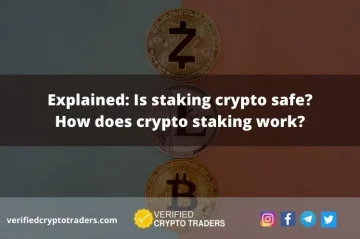
Table of Contents
If you’re a cryptocurrency investor, you’ve probably heard a lot about staking. Staking crypto confirms transactions in numerous cryptocurrencies while also allowing users to earn rewards for their investments.
What is cryptocurrency staking, though? Staking crypto is the process of pledging your crypto assets to a blockchain network to support it and confirm the transactions.
Staking is compatible with cryptocurrencies that process payments using the proof-of-stake approach. Compared to the original proof-of-work paradigm, this is a more energy-efficient option.
Risks of Staking Crypto
There are a few risks to be cautious of when staking crypto:
- Cryptocurrency prices are extremely unpredictable, and they can drop substantially. Any interest you earn on your staked assets may be wiped out if their value falls.
- The best staking coins may force you to keep your coins locked up for a certain amount of time. You won’t be able to do anything with your staked assets during that time, including selling them.
- You could have to wait seven days or longer to unstake your cryptocurrency.
The most serious risk of crypto staking is that the price will plummet. Keep this in mind if you come across currencies with exceptionally high staking reward rates.
How does staking in crypto work?
In cryptocurrencies that follow the proof-of-stake idea, staking is how new transactions are added to the network. Participants initially pledged their currency to the bitcoin protocol. Validators are chosen among these people by the protocol to confirm transaction blocks. You’re more likely to be picked as a validator if you promise more money.
Whenever a new blockchain is added to the network, new bitcoin coins are created and distributed as staking rewards to the block’s validator. The payouts are always the same type of coin that the players are staking. On the other hand, some blockchains use a different form of cryptocurrency as a reward.
To stake crypto, you must own a cryptocurrency that uses the proof-of-stake model. After that, you can select how much you want to wager. You can do so on a lot of famous bitcoin exchanges. Your coins remain in your possession after you stake them. You’re effectively putting them to work, and if you want to trade them later, you may unstack them at any time. The unstacking process might take some time, and some cryptocurrencies may need you to stake coins for a set amount of time.
Staking isn’t possible with all sorts of cryptocurrencies. Only cryptocurrencies with a proof-of-stake model are accepted. Many cryptos use the proof-of-work principle to add blocks to their blockchains. The main problem with proof of work is that it requires a lot of processing power. As a result, proof-of-work cryptocurrencies consume a lot of energy. Bitcoin (CRYPTO: BTC) has been punished due to environmental concerns.
When you should or shouldn’t do cryptocurrency staking
Suppose you have cryptocurrency to stake and don’t plan on exchanging it anytime soon. It requires little work on y our part, and as a result, you will earn more money.
What if you don’t have any cryptocurrencies to stake right now? Numerous cryptocurrencies allow betting, but you need to consider whether each is a worthwhile investment. If you believe it is an excellent long-term investment, buying a coin for staking only makes sense.
Ethereum, Cardano, Polkadot, and Solana are some of the best crypto staking coins.





